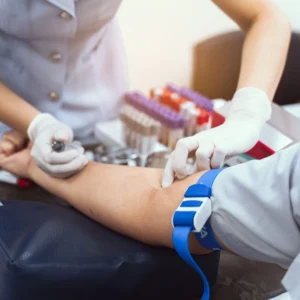Do blood tests require fasting? It’s important to know that before a blood test your doctor requested, you might be advised against eating or drinking anything, but is fasting always required? The reply is influenced by the kind of test being administered.
In this article, we will discuss which blood tests require fasting, why it matters, and how to get ready for accurate results. Whether you’ve fasted previously or require a reminder, this guide will assist you in comprehending how fasting influences your Blood Test at Home.
What is Blood Testing?
A blood test involves a laboratory examination performed on a blood sample, usually taken through a finger stick or a hypodermic needle from a vein in the arm.
Besides assisting your doctor in recognizing or monitoring various issues, blood tests can also assess your overall health. While blood tests are not perfect, they are generally reliable.
Do Blood Tests Require Fasting?
Yes, fasting demands consuming only water for a set time (generally between 8 and 12 hours) before your test for certain types. It is important because food intake can change the concentration of many constituents in blood and lead to being deceived.
A popular method to acquire a more explicit picture of the body’s internal processes during blood tests is to fast. A clearer baseline reading of naturally ventilating compounds is made possible by its assistance in preventing the circulation’s intermittent absorption of minerals, carbohydrates, and fats. As a result, the measurement is more accurate and the results are interpreted more consistently.
What does it mean to Fast Before a Blood Test?
Before a blood test, a person who is fasting must not eat or drink anything other than water for a particular portion of time, generally 8 to 12 hours. This is carried out for certain substances (such as blood sugar, glucose, cholesterol, and Triglycerides, etc.) in the blood to be influenced by food and beverages (especially anything containing caffeine) before the test.
Things to do while fasting:
- Take a sip of water.
- Take your medications as prescribed by your physician.
Things to bypass during a fast:
- Eat anything you want.
- Drink beverages like tea, coffee, soda, or juice.
- Use chewing gum or mints.
Always adhere to the exact instructions given by the lab or your physician because various tests may require different procedures.
When Fasting is Mandated for a Blood Test:
Fasting is fundamental in the following instance to obtain accurate results
- Blood glucose test
- Lipid shape(cholesterol and triglycerides testing)
- Metabolism functional test (MBP)
- Several liver tests
When Fasting is not Mandated for a Blood Test:
Normally, fasting is not needed for the following test:
- CBC-complete blood count
- Thyroid panel (thyroid functioning test)
- HbA1c (gulocose level test) long-term
- Hormonal testing
- Kidney and liver examinations
- PT OR INR ( monitoring blood clotting)
Suggestions for an Effective Blood Test:
- Prepare your test early in the morning to make fasting easier..
- Stay hydrated by consuming tons of water.
- Take your meds exactly as the doctor has prescribed.
- After your test, bring a nutritious snack to eat. If you mistakenly break your fast, notify your lab technician.
Final Quote:
Though it seems to be a small action, fasting earlier a blood examination is compulsory for trustworthy outcomes. Mainly, for tests assessing cholesterol and glucose. Although not all tests mandate fasting, knowing when to prepare can improve the testing methodology and confirm a valid diagnosis and remedy techniques.
Book us now to do a blood test!
To guarantee appropriate and effective blood tests for every patient, get our services of a Doctor at Home for precise diagnosis and a systematic blood testing procedure. Reserve an appointment right now to get more details on whether do blood test requires fasting, or book us now for blood blood test a home.
FAQs
Why fast is vital before the blood test?
Fasting proves consistent test outcomes.
What is the duration of the fast?
Usually, one should refrain from eating for 7 to 10 hours previous to the blood test.
Is it permissible to smoke or chew gum while fasting?
No, smoking and chewing may influence the test outcomes.
Is it permissible to consume water while fasting?
Sure, maintaining hydration is vital.
Is it permissible to carry a routine prescription while fasting?
Yes, patients may carry their daily prescription with just water.



